by Lisa Cooke | Sep 9, 2015 | 01 What's New, images, Mobile
 The Genealogy Gems website is now mobile-friendly. Your go-to family history resource just got a whole lot easier to read on-the-go!
The Genealogy Gems website is now mobile-friendly. Your go-to family history resource just got a whole lot easier to read on-the-go!
Here at Genealogy Gems we are working hard every day to create a compelling resource for genealogy inspiration, tips, tech tools and news you can use RIGHT NOW. That’s why we are pleased as punch to let you know that our new mobile-friendly site design makes it easier to soak up all the ideas on our pages regardless of the size of your device’s screen.
Here are some of our website highlights that are especially mobile-friendly:
- The free Genealogy Gems podcast (with over 1.75 million downloads) has been entertaining and educating family history lovers around the world for almost 10 years. Back in the “old” days (circa 2007) the only way to get your hands on a podcast (recorded “radio” show) was to download iTunes, subscribe to the podcast, and listen through your computer speakers. If you were lucky enough to have an iPod you could plug it in and figure out how to transfer the audio files so you could listen untethered from your computer. Today, smartphones make it oh-so-easy to take us with you when commuting, exercising, gardening and more. You can subscribe to the free show through the Podcasts app (iOS) or better yet download the Genealogy Gems app (in the iTunes Store and for Android) and you’ll also get access to great bonus content.
- Our daily blog keeps readers up to date on new genealogy record collections, industry news, the genetic genealogy industry and technology tools. We boost your research skills, take you to must-see news articles and more. Mobile readers can get their daily dose of genealogy gems from our website or by following our Facebook page (See us First on Facebook to stay current on our posts). Our convenient category search (you’ll find it in the upper left corner of our home page) makes it easy to target posts on your favorite topics.
- The free Family History Made Easy podcast teaches listeners step-by-step, episode by episode, how to start their genealogy research off right–and keep it going. Refresh your skills with the entire series or catch individual episodes for a targeted brush-up.
- Premium Members-Only videos and podcast. Genealogy Gems Premium members can access over 2 dozen instructional videos on Lisa’s most popular topics (the same standing-room-only content Lisa delivers at top conferences). The premium podcast delivers more of Lisa’s signature brand of warm conversation, expert interviews, how-tos and more. Click here to learn more about Premium membership and take the best of Lisa Louise Cooke along wherever you go.
 Resources
Resources
Mobile-Friendly Search Results Come to Google
Compare Look-Alikes in Your Family with this Web App
Ancestry App for Apple Watch
by Lacey Cooke | Jun 7, 2019 | 01 What's New, Records & databases, Swedish |
This week’s Friday records post is all about Swedish genealogy! Findmypast has added 12 million Swedish records to their international collection, and we’ll show you other resources for accessing similar records. We’ll also highlight some past unique collections for Sweden, and you can explore expert research tips from a professional genealogist.
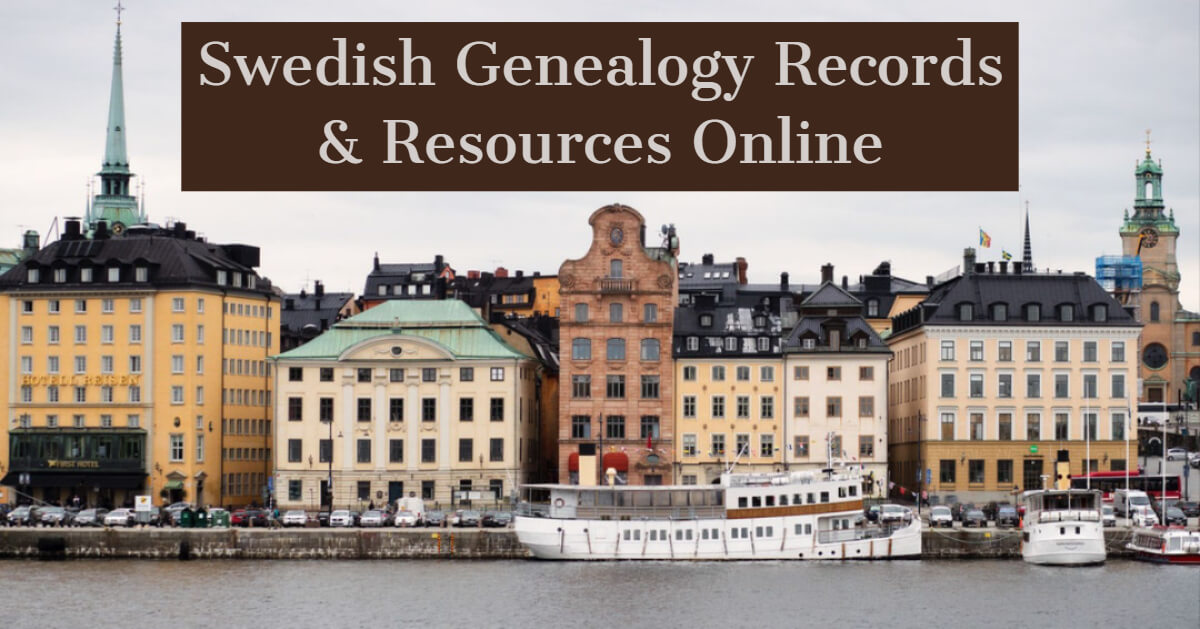
Featured: Swedish Genealogy Records Online
June 6 is the National Day of Sweden, which honors two historical events: Gustav Vasa being elected king on June 6, 1523, and the adoption of a new constitution on June 6, 1809. After decades of discussion, the Swedish parliament finally voted to make June 6 a public holiday. And we can’t think of a better way to observe than to spend time researching your Swedish ancestors!
As Findmypast continues to grow their international records database, they’ve highlighted the recent addition of Swedish records to their collection. Over 12 million Swedish baptisms, marriages, and burials are now dating back to 1611 are now available to search on Findmypast. These records will also generate hints against your Findmypast family tree.
Their Swedish collection consist of the following indexes:
If you’re a Findmypast subscriber, head over there now to explore these indexed records. If you’re not a Findmypast subscriber, you can explore select Swedish baptisms, burials, and marriages at Ancestry.com. You can also find select Swedish baptisms, burials, and marriages at FamilySearch.org for free.
Unique Swedish Genealogy Resources
Swedish Newspapers. A couple of years back we highlighted the Minnesota Historical Society’s collection of Swedish-American newspapers. They are available through an online portal. Users can explore more than 300,000 pages from 28 different Swedish-American newspaper titles published across the U.S. between 1859 and 2007. The portal is available in Swedish and English and includes a keyword search.
Biographies of notable Swedish women. The Chicago Evening Post reported on a new online biographical dictionary of women in Swedish history. The site itself is Svenskt kvinnobiografiskt lexicon (it does have an English-language home page). The home page encourages visitors to “Read up on 1,000 Swedish women from the Middle Ages to the present day. Use the search function to reveal what these women got up to, how they were educated, which organisations they belonged to, where they travelled, what they achieved, and much more. All of them contributed in a significant way to the development of Swedish society.” According to the Chicago Evening Post, the current collection of 1,000 biographical sketches will soon double (at least)
Expert Swedish Genealogy Research Tips
Swedish genealogy can be daunting. Many people avoid Swedish research because they don’t speak the language and because the names change every generation–like from Ole Olsson to Ole Nilsson to Nils Pehrrson. Despite these barriers, Swedish research can be relatively simple, fun, and successful! In a special guest article, Paul Woodbury, a Senior Genealogist with Legacy Tree Genealogists, shares the following 5 things to keep in mind when researching your Swedish ancestors:
- You can “read” many records without reading Swedish.
- Family events are summarized in Swedish clerical examinations.
- Many Swedish records cross-reference each other.
- You can trouble-shoot record gaps.
- There are some excellent Swedish indexes and databases online.
Paul covers these 5 points in-depth in this special article. Click here to read it now!
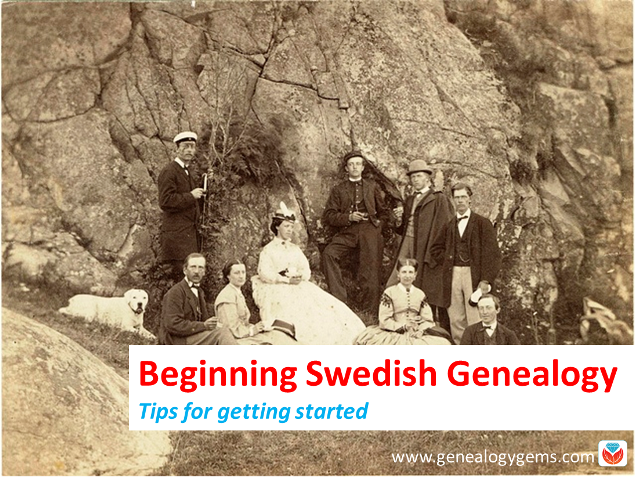

About the Author: Lisa Louise Cooke is the producer and host of the Genealogy Gems Podcast, an online genealogy audio show and app. She is the author of the books The Genealogist’s Google Toolbox, Mobile Genealogy, How to Find Your Family History in Newspapers, and the Google Earth for Genealogy video series. She is an international keynote speaker and the Vice President of the Genealogical Speakers Guild.
Disclosure: This article contains affiliate links and Genealogy Gems will be compensated if you make a purchase after clicking on these links (at no additional cost to you). Thank you for supporting Genealogy Gems!
by Diahan Southard | Oct 10, 2015 | 01 What's New, Listeners & Readers, Travel
If you would love to take a genealogy travel adventure to your ancestral homeland, consider who might help you make it happen. Get inspired and ready with these tips!
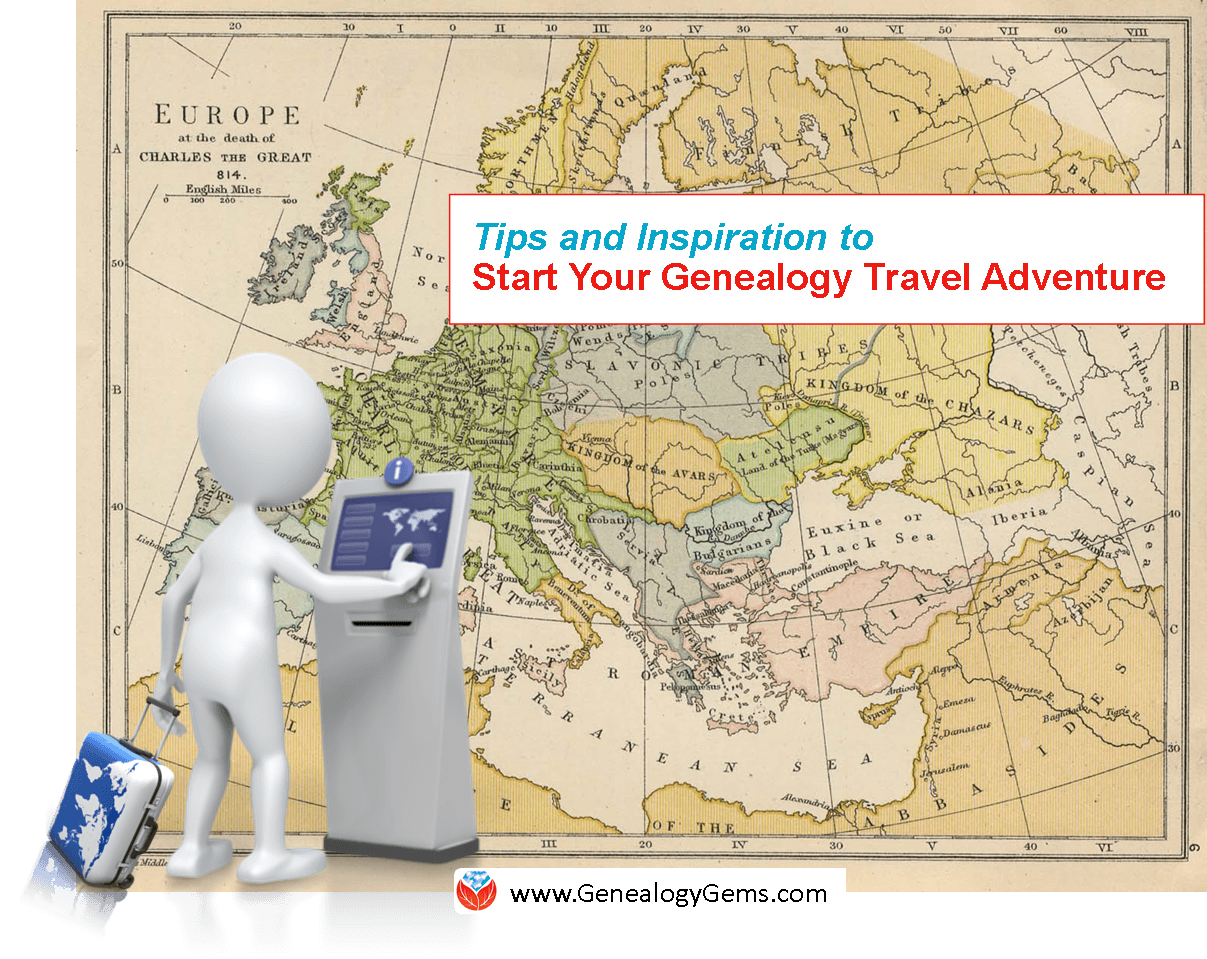
Map: Wikimedia Commons image. Click to view.
Recently Joyce, a Genealogy Gems Premium member, wrote in to thank me for the new Premium video, Inspiring Ways to Captivate the Non-Genealogists in Your Life. Then she asked a great question:
“What I would really like to know is if you have any travel agent/agency that is great for Europe travel to do my own ‘Who Do You Think You Are.’ Any help or direction you can give would be much appreciated.”
I have just the thing for Joyce’s travel question! In the free Genealogy Gems Podcast episode 115, I interviewed Kathy Wurth, who specializes in family history tours of Europe. (You will find her contact information here on the show notes page for the episode.) Even if she doesn’t go to the locations you want to visit, I’m sure that she could help match you up with a travel consultant who does. Tell her “hi” for me!
Before you set off on your own genealogy travel adventure, get inspired and get ready! Here are some great resources for doing just that:
Get inspired! Listen to or read about these genealogists’ travel adventures to ancestral homelands that I’ve covered on Genealogy Gems in the past:
She Left Me the Gun: My Mother’s Life Before Me by Emma Brockes. An award-winning journalist tells the story of her discovery of her mother’s tragic childhood in South Africa. This is a genealogical journey, complete with trips to archives, poring over old court cases and dramatic reveals. This is the ultimate how-to book for exploring and sharing sensitive family stories because she shows you how it’s done. Listen to an excerpt of our interview with Emma Brockes on the Genealogy Gems podcast episode 174 and the full-length interview in Premium episode 118.
by Emma Brockes. An award-winning journalist tells the story of her discovery of her mother’s tragic childhood in South Africa. This is a genealogical journey, complete with trips to archives, poring over old court cases and dramatic reveals. This is the ultimate how-to book for exploring and sharing sensitive family stories because she shows you how it’s done. Listen to an excerpt of our interview with Emma Brockes on the Genealogy Gems podcast episode 174 and the full-length interview in Premium episode 118.
Three Slovak Women, Second Edition by Lisa Alzo. A popular genealogy expert’s story of three generations of Slovak women in the steel-producing town of Duquesne, Pennsylvania, and the love and sense of family binding them together. Click here to hear Lisa in the free Family History Made Easy podcast talk about her reasons for researching her family history and what she’s learned along the way, including in her travels in Eastern Europe.
by Lisa Alzo. A popular genealogy expert’s story of three generations of Slovak women in the steel-producing town of Duquesne, Pennsylvania, and the love and sense of family binding them together. Click here to hear Lisa in the free Family History Made Easy podcast talk about her reasons for researching her family history and what she’s learned along the way, including in her travels in Eastern Europe.
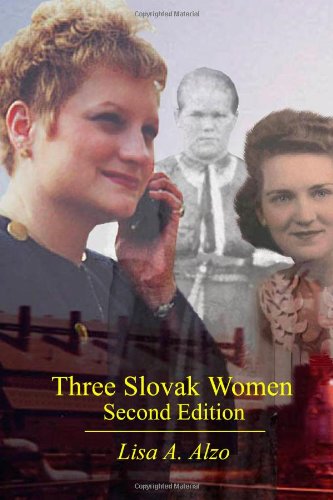
Running Away to Home: Our Family’s Journey to Croatia in Search of Who We Are, Where We Came From, and What Really Matters by Jennifer Wilson. In this book, Jennifer takes us on a once-in-a-lifetime genealogical journey. She walked in her ancestors’ shoes and lived among their descendants. I profiled this book in Episode 129 of the Genealogy Gems podcast and was so inspired by the story that she created this YouTube video on the book.
by Jennifer Wilson. In this book, Jennifer takes us on a once-in-a-lifetime genealogical journey. She walked in her ancestors’ shoes and lived among their descendants. I profiled this book in Episode 129 of the Genealogy Gems podcast and was so inspired by the story that she created this YouTube video on the book.
Get ready! Here are some free travel tips for genealogists from our friends over at Family Tree Magazine:
More Resources from Genealogy Gems on Family History Travel Adventures:
Family History Travel with a Non-Genealogist Companion: Tips and Laughs on the Genealogy Gems Premium Podcast episode 124 (Genealogy Gems Premium website subscription required to access; click here to learn more)
Look for Genealogy Records in a State Capital When You’re Traveling There
Road Trip, Anyone? An Orphan Train Museum
If you want to take a genealogy travel adventure–or invite someone else to–please share this article with them! Just email a link or It’s easy, it’s free–and maybe you’ll pick up a travel companion! Happy travels!
by Lisa Cooke | Apr 8, 2015 | 01 What's New, Google, Research Skills
This just in! Google Scholar and ProQuest are teaming up to provide a publicly-accessible index to all of ProQuest’s scholarly journal content. Google Scholar already delivers search results on your favorite genealogy keywords (names, places and records) from scholarly publications like dissertations, academic articles and more. (Click here to read my blog post about Google Scholar for genealogy.)
just in! Google Scholar and ProQuest are teaming up to provide a publicly-accessible index to all of ProQuest’s scholarly journal content. Google Scholar already delivers search results on your favorite genealogy keywords (names, places and records) from scholarly publications like dissertations, academic articles and more. (Click here to read my blog post about Google Scholar for genealogy.)
Now the search experience will become more powerful and inclusive. According to a press release, “ProQuest will enable the full text of its scholarly journal content to be indexed in Google Scholar, improving research outcomes. Work is underway and the company anticipates that by the third-quarter of 2015, users starting their research in Google Scholar will be able to access scholarly content via ProQuest.”
“ProQuest has rich, vast content that advances the work of researchers, scholars and students,” blogged the CEO of ProQuest. “Respecting the different ways researchers and librarians choose to conduct their research is essential to ensuring that content is simple to discover and use. We know Google Scholar is a popular starting point for researchers of all kinds. Our teamwork with Google will enable these patrons to be automatically recognized as authenticated ProQuest users and seamlessly link to their ProQuest collections, where they can connect with full-text scholarly content.”
It appears that there will still be a charge to access copyright-protected material (“authenticated ProQuest users” in the quote above are those that have access via a ProQuest subscription). According to the press release, “Users who are not recognized will be sent to a landing page with the abstract or an image of the first page, protecting all rights holders. To read full text, the users will authenticate themselves. There is nothing for libraries to set up – the linking will be seamless and automatic.”
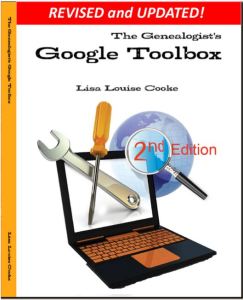 Learn more about using Google Scholar and other advance Google search techniques to discover your family history online in The Genealogist’s Google Toolbox Second Edition. The newly-updated and fully-revised book is available now!
Learn more about using Google Scholar and other advance Google search techniques to discover your family history online in The Genealogist’s Google Toolbox Second Edition. The newly-updated and fully-revised book is available now!
 The Genealogy Gems website is now mobile-friendly. Your go-to family history resource just got a whole lot easier to read on-the-go!
The Genealogy Gems website is now mobile-friendly. Your go-to family history resource just got a whole lot easier to read on-the-go!






 just in! Google Scholar and ProQuest are teaming up to provide a publicly-accessible index to all of ProQuest’s scholarly journal content. Google Scholar already delivers search results on your favorite genealogy keywords (names, places and records) from scholarly publications like dissertations, academic articles and more. (
just in! Google Scholar and ProQuest are teaming up to provide a publicly-accessible index to all of ProQuest’s scholarly journal content. Google Scholar already delivers search results on your favorite genealogy keywords (names, places and records) from scholarly publications like dissertations, academic articles and more. (